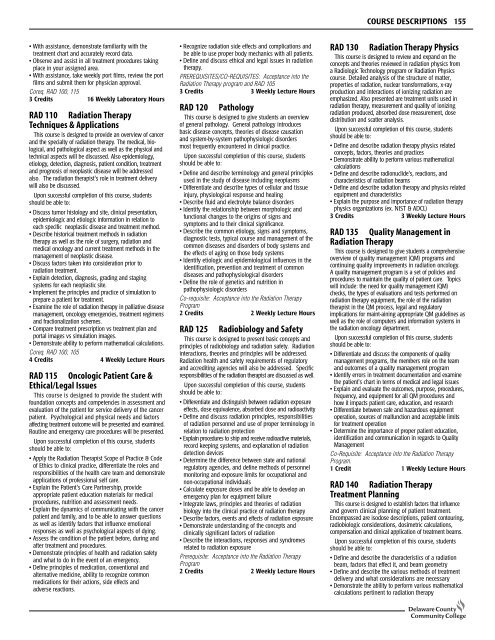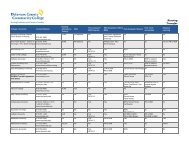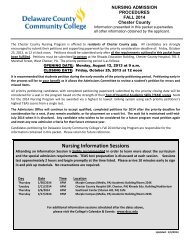2010 Catalog - Delaware County Community College
2010 Catalog - Delaware County Community College
2010 Catalog - Delaware County Community College
You also want an ePaper? Increase the reach of your titles
YUMPU automatically turns print PDFs into web optimized ePapers that Google loves.
COURSE DESCRIPTIONS 155<br />
• With assistance, demonstrate familiarity with the<br />
treatment chart and accurately record data.<br />
• Observe and assist in all treatment procedures taking<br />
place in your assigned area.<br />
• With assistance, take weekly port films, review the port<br />
films and submit them for physician approval.<br />
Coreq. RAD 100, 115<br />
3 Credits 16 Weekly Laboratory Hours<br />
RAD 110 Radiation Therapy<br />
Techniques & Applications<br />
This course is designed to provide an overview of cancer<br />
and the specialty of radiation therapy. The medical, biological,<br />
and pathological aspect as well as the physical and<br />
technical aspects will be discussed. Also epidemiology,<br />
etiology, detection, diagnosis, patient condition, treatment<br />
and prognosis of neoplastic disease will be addressed<br />
also. The radiation therapist's role in treatment delivery<br />
will also be discussed.<br />
Upon successful completion of this course, students<br />
should be able to:<br />
• Discuss tumor histology and site, clinical presentation,<br />
epidemiologic and etiologic information in relation to<br />
each specific neoplastic disease and treatment method.<br />
• Describe historical treatment methods in radiation<br />
therapy as well as the role of surgery, radiation and<br />
medical oncology and current treatment methods in the<br />
management of neoplastic disease.<br />
• Discuss factors taken into consideration prior to<br />
radiation treatment.<br />
• Explain detection, diagnosis, grading and staging<br />
systems for each neoplastic site.<br />
• Implement the principles and practice of simulation to<br />
prepare a patient for treatment.<br />
• Examine the role of radiation therapy in palliative disease<br />
management, oncology emergencies, treatment regimens<br />
and fractionalization schemes.<br />
• Compare treatment prescription vs treatment plan and<br />
portal images vs simulation images.<br />
• Demonstrate ability to perform mathematical calculations.<br />
Coreq. RAD 100, 105<br />
4 Credits 4 Weekly Lecture Hours<br />
RAD 115 Oncologic Patient Care &<br />
Ethical/Legal Issues<br />
This course is designed to provide the student with<br />
foundation concepts and competencies in assessment and<br />
evaluation of the patient for service delivery of the cancer<br />
patient. Psychological and physical needs and factors<br />
affecting treatment outcome will be presented and examined.<br />
Routine and emergency care procedures will be presented.<br />
Upon successful completion of this course, students<br />
should be able to:<br />
• Apply the Radiation Therapist Scope of Practice & Code<br />
of Ethics to clinical practice, differentiate the roles and<br />
responsibilities of the health care team and demonstrate<br />
applications of professional self care.<br />
• Explain the Patient's Care Partnership, provide<br />
appropriate patient education materials for medical<br />
procedures, nutrition and assessment needs.<br />
• Explain the dynamics of communicating with the cancer<br />
patient and family, and to be able to answer questions<br />
as well as identify factors that influence emotional<br />
responses as well as psychological aspects of dying.<br />
• Assess the condition of the patient before, during and<br />
after treatment and procedures.<br />
• Demonstrate principles of health and radiation safety<br />
and what to do in the event of an emergency.<br />
• Define principles of medication, conventional and<br />
alternative medicine, ability to recognize common<br />
medications for their actions, side effects and<br />
adverse reactions.<br />
• Recognize radiation side effects and complications and<br />
be able to use proper body mechanics with all patients.<br />
• Define and discuss ethical and legal issues in radiation<br />
therapy.<br />
PREREQUISITES/CO-REQUISITES: Acceptance into the<br />
Radiation Therapy program and RAD 105<br />
3 Credits 3 Weekly Lecture Hours<br />
RAD 120<br />
Pathology<br />
This course is designed to give students an overview<br />
of general pathology. General pathology introduces<br />
basic disease concepts, theories of disease causation<br />
and system-by-system pathophysiologic disorders<br />
most frequently encountered in clinical practice.<br />
Upon successful completion of this course, students<br />
should be able to:<br />
• Define and describe terminology and general principles<br />
used in the study of disease including neoplasms<br />
• Differentiate and describe types of cellular and tissue<br />
injury, physiological response and healing<br />
• Describe fluid and electrolyte balance disorders<br />
• Identify the relationship between morphologic and<br />
functional changes to the origins of signs and<br />
symptoms and to their clinical significance.<br />
• Describe the common etiology, signs and symptoms,<br />
diagnostic tests, typical course and management of the<br />
common diseases and disorders of body systems and<br />
the effects of aging on those body systems<br />
• Identify etiologic and epidemiological influences in the<br />
identification, prevention and treatment of common<br />
diseases and pathophysiological disorders<br />
• Define the role of genetics and nutrition in<br />
pathophysiologic disorders<br />
Co-requisite: Acceptance into the Radiation Therapy<br />
Program<br />
2 Credits 2 Weekly Lecture Hours<br />
RAD 125<br />
Radiobiology and Safety<br />
This course is designed to present basic concepts and<br />
principles of radiobiology and radiation safety. Radiation<br />
interactions, theories and principles will be addressed.<br />
Radiation health and safety requirements of regulatory<br />
and accrediting agencies will also be addressed. Specific<br />
responsibilities of the radiation therapist are discussed as well.<br />
Upon successful completion of this course, students<br />
should be able to:<br />
• Differentiate and distinguish between radiation exposure<br />
effects, dose equivalence, absorbed dose and radioactivity<br />
• Define and discuss radiation principles, responsibilities<br />
of radiation personnel and use of proper terminology in<br />
relation to radiation protection<br />
• Explain procedures to ship and receive radioactive materials,<br />
record keeping systems, and explanation of radiation<br />
detection devices<br />
• Determine the difference between state and national<br />
regulatory agencies, and define methods of personnel<br />
monitoring and exposure limits for occupational and<br />
non-occupational individuals<br />
• Calculate exposure doses and be able to develop an<br />
emergency plan for equipment failure<br />
• Integrate laws, principles and theories of radiation<br />
biology into the clinical practice of radiation therapy<br />
• Describe factors, events and effects of radiation exposure<br />
• Demonstrate understanding of the concepts and<br />
clinically significant factors of radiation<br />
• Describe the interactions, responses and syndromes<br />
related to radiation exposure<br />
Prerequisite: Acceptance into the Radiation Therapy<br />
Program<br />
2 Credits 2 Weekly Lecture Hours<br />
RAD 130<br />
Radiation Therapy Physics<br />
This course is designed to review and expand on the<br />
concepts and theories reviewed in radiation physics from<br />
a Radiologic Technology program or Radiation Physics<br />
course. Detailed analysis of the structure of matter,<br />
properties of radiation, nuclear transformations, x-ray<br />
production and interactions of ionizing radiation are<br />
emphasized. Also presented are treatment units used in<br />
radiation therapy, measurement and quality of ionizing<br />
radiation produced, absorbed dose measurement, dose<br />
distribution and scatter analysis.<br />
Upon successful completion of this course, students<br />
should be able to:<br />
• Define and describe radiation therapy physics related<br />
concepts, factors, theories and practices<br />
• Demonstrate ability to perform various mathematical<br />
calculations<br />
• Define and describe radionuclide's, reactions, and<br />
characteristics of radiation beams<br />
• Define and describe radiation therapy and physics related<br />
equipment and characteristics<br />
• Explain the purpose and importance of radiation therapy<br />
physics organizations (ex. NIST & ADCL)<br />
3 Credits 3 Weekly Lecture Hours<br />
RAD 135 Quality Management in<br />
Radiation Therapy<br />
This course is designed to give students a comprehensive<br />
overview of quality management (QM) programs and<br />
continuing quality improvements in radiation oncology.<br />
A quality management program is a set of policies and<br />
procedures to maintain the quality of patient care. Topics<br />
will include: the need for quality management (QM)<br />
checks, the types of evaluations and tests performed on<br />
radiation therapy equipment, the role of the radiation<br />
therapist in the QM process, legal and regulatory<br />
implications for maint-aining appropriate QM guidelines as<br />
well as the role of computers and information systems in<br />
the radiation oncology department.<br />
Upon successful completion of this course, students<br />
should be able to:<br />
• Differentiate and discuss the components of quality<br />
management programs, the members role on the team<br />
and outcomes of a quality management program<br />
• Identify errors in treatment documentation and examine<br />
the patient's chart in terms of medical and legal issues<br />
• Explain and evaluate the outcomes, purpose, procedures,<br />
frequency, and equipment for all QM procedures and<br />
how it impacts patient care, education, and research<br />
• Differentiate between safe and hazardous equipment<br />
operation, sources of malfunction and acceptable limits<br />
for treatment operation<br />
• Determine the importance of proper patient education,<br />
identification and communication in regards to Quality<br />
Management<br />
Co-Requisite: Acceptance into the Radiation Therapy<br />
Program.<br />
1 Credit 1 Weekly Lecture Hours<br />
RAD 140 Radiation Therapy<br />
Treatment Planning<br />
This course is designed to establish factors that influence<br />
and govern clinical planning of patient treatment.<br />
Encompassed are isodose descriptions, patient contouring,<br />
radiobiologic considerations, dosimetric calculations,<br />
compensation and clinical application of treatment beams.<br />
Upon successful completion of this course, students<br />
should be able to:<br />
• Define and describe the characteristics of a radiation<br />
beam, factors that effect it, and beam geometry<br />
• Define and describe the various methods of treatment<br />
delivery and what considerations are necessary<br />
• Demonstrate the ability to perform various mathematical<br />
calculations pertinent to radiation therapy

















